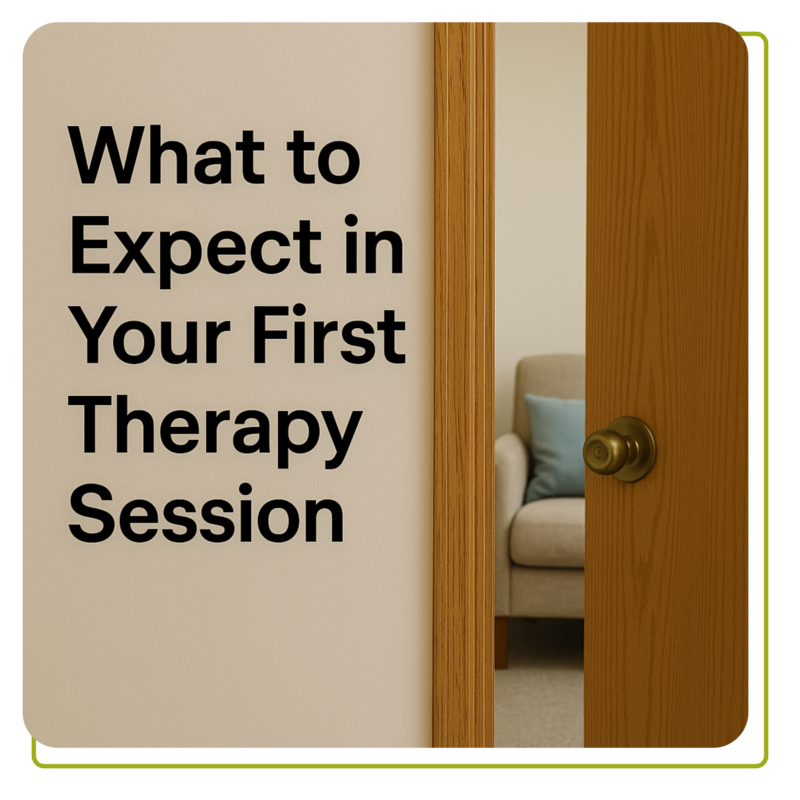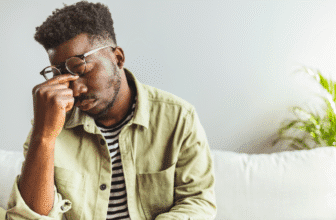Starting therapy might feel like opening a door you’ve been staring at for a long time — equal parts relief, curiosity, and uncertainty. What will it be like? Will your therapist understand you? Will it actually help? If you’re new to therapy, these unknown elements can stack up and exacerbate anxieties surrounding meeting your therapist and beginning treatment. But the first sessions aren’t about solving everything at once: they’re about laying the groundwork for real, lasting change.
Knowing what to expect from your first sessions can alleviate some of that first-time therapy anxiety and nervousness. Let’s break down what you can expect as you’re getting comfortable with your therapist and how to make the most of those early sessions.
Related: A Step-By-Step Guide to Finding the Right Therapist
Table of Contents:
- Preparing for Your First Therapy Session
- What Typically Happens During a First Therapy Session?
- Common Questions Therapists May Ask
- Questions You May Want to Ask Your Therapist
- What To Do After Your First Therapy Session
- Therapists Share What to Expect in Your First Session
- The Second and Third Sessions: Deepening Understanding
- Finding the Right Therapist for You
Preparing for Your First Therapy Session
Embarking on your first therapy session is like opening a new chapter in your journey towards understanding and healing. To make the most of this initial meeting, it’s helpful to come prepared with a few essentials and a willingness to be open and share. Consider the following:
- What to Bring: Come with an ID card and insurance card if you plan to use insurance, along with any documents detailing your mental health history. A notebook can be invaluable for jotting down thoughts and topics you wish to discuss.
- How to Mentally Prepare: Think about questions you’re curious to explore with your therapist and write them down. Consider questions about their approach or how therapy can best support your goals.
- Preparing for Virtual Therapy: If your session is virtual, ensure you find a quiet, private space where you can speak freely and without interruption. Test your internet connection and video call software ahead of time to prevent technical glitches.
Remember, getting ready for your first therapy session is a step towards creating a space where you can engage openly and comfortably and foster a relationship grounded in understanding and support. It’s okay to be nervous about your first few sessions, and preparing for them can ease your anxieties.
Read More: Thinking About Starting Your Therapy Journey? Now’s the Time
What Typically Happens During a First Therapy Session?
Stepping into your first therapy session can be nerve-wracking, but once you get through it, you’ll feel more at ease about the whole process. If you’re attending a session in person, you’ll likely check in at the front desk and spend a few moments in the waiting area when you arrive. In this moment, provide a brief pause to center yourself.
When the session begins, you’ll probably exchange introductions with your therapist to set a foundation for open communication. Your therapist will likely start by exploring the reasons you’re seeking therapy, delving into any past approaches you’ve taken towards mental health, and discussing ways to set goals in therapy.
Remember, therapy is a collaborative dialogue where setting realistic goals becomes a shared focus. The initial meeting is just the beginning, and you’re not expected to unpack everything at once. It’s an opportunity to lay the groundwork for a supportive relationship where your therapist is there to guide you and ensure you feel heard, understood, and ready to embark on this journey together.
Common Questions Therapists May Ask
During the initial meeting, your therapist may pose a range of questions designed to gently uncover the layers of your current experience. These inquiries might touch on why you’ve chosen to seek therapy now, what specific concerns you’re facing, and any relevant aspects of your personal history. Remember that you’re not expected to divulge every detail immediately; this is the beginning of a relationship rooted in trust and mutual respect.
Some initial questions they might ask you could include:
- Have you attended therapy in the past?
- What are your symptoms?
- Do you have any mental health issues in your family history?
- How is your home life?
- Do you have a history of suicidal ideation?
- Do you have a history of self-harm?
- What do you hope to get from therapy?
- What do you want to accomplish in sessions?
As you navigate these questions, you’ll also have the opportunity to learn about your therapist’s approach and clarify any logistical details, such as confidentiality and session structure. This dialogue sets the stage for a collaborative process, ensuring you feel comfortable and engaged as you move forward on this path of self-discovery and healing.
Questions You May Want to Ask Your Therapist
During your first few sessions, it’s perfectly natural to have questions swirling in your mind. Finding the right therapist is about building a relationship with them, so you should ask your therapist questions, too. Asking your therapist questions helps clarify any worries or concerns you may harbor about the treatment process. You can ask questions like:
- Is this confidential?
- When would you need to break confidentiality?
- How long have you been a therapist?
- Do you have any experience with my specific type of mental health issues?
- Have you ever been to therapy yourself?
- What kind of things should I plan to do between our sessions?
Voicing these inquiries can provide clarity and comfort. Remember, this is your space to explore and understand. Allow yourself the grace to ask freely, fostering an environment where your healing journey can unfold with openness and understanding.
What To Do After Your First Therapy Session
As you step out of your first therapy session, it’s important to take a moment for self-reflection and consider how you felt during the meeting. Evaluating your comfort level with your therapist is a crucial part of the process, but don’t forget that change and comfort will be gradual. It’s completely normal if you don’t feel an immediate sense of transformation.
During or right after your first therapy session is a good time to schedule follow-up sessions and address any initial concerns you might have had. Your therapist may also suggest “homework” activities — such as journaling your thoughts, practicing mindfulness exercises, or engaging in self-care routines — which are designed to deepen the work you do in sessions. These tasks are not about adding pressure but rather about nurturing your growth between meetings. Allow yourself to engage with these activities at your own pace, embracing the gradual process of healing and learning about yourself.
Therapists Share What to Expect in Your First Session
Navigating the uncharted waters of a first therapy session can stir a mix of emotions, where your uncertainty and curiosity can intertwine. To help illuminate this experience and guide you when preparing for a therapy session, several professional therapists share insights into what typically unfolds when welcoming newcomers into their practice.
Marla B. Cohen, PsyDTherapist Marla Cohen: In your first session, your therapist will spend some time getting to know you and the issues that brought you into treatment. He or she may use a formal, structured interview, or it may just feel like a more free-flowing conversation. The therapist will ask questions about your presenting concerns, as well as your history and background. Most likely, you’ll find yourself talking about your current symptoms or struggles, as well as saying a bit about your relationships, your interests, your strengths, and your goals.
Most importantly, in that first session, you will begin making a connection with your therapist. You should feel safe, accepted, respected, and relatively comfortable. Not all therapists are right for every person, so use your first session to assess whether or not the therapist you chose feels like a good match for your personality.
Lynn Somerstein, PhD, E-RYT: Usually, in your first session you will be invited to be seated comfortably. The therapist will usually begin with some initial small talk to help you feel at ease. I usually make reference to the scariness of starting therapy, since I like to honor the feelings that are present. That’s a feature of therapy: find out where the person is and start there.
Sometimes people have lots to say and start talking right away, pouring out their thoughts and feelings, and sometimes their fears and tears, too.
Other people find it very hard to speak, so I’ll ask questions about how they decided to come to therapy, why therapy with me and not somebody else, whether they have been in treatment before, and whether there is something in particular troubling them. Each statement the person in therapy makes leads to many other questions.
I say what my expectations are: that people come on time, that they pay on time, that they say what is on their minds—even if it sounds silly to them. In fact, especially if it sounds silly; those silly ideas are frequently the best things to talk about because they often lead to issues that need to be explored.
Toward the end of the first session, I also always thank the person for coming, say that I’ve asked a lot of questions (if indeed I have), and invite the person in therapy to ask me questions. Sometimes people feel it’s not polite, and they are afraid. So, then I say not to worry about courtesy, that I’ll probably feel comfortable answering, but that if, for some reason, I don’t want to answer something, I’ll say so and we’ll move on.
Then we discuss whether we’d like to meet again and, if so, when. I’ll say how often I think we should meet, and we’ll talk about that too.
The Second and Third Sessions: Deepening Understanding
As you continue to meet, your therapist will start to get a clearer picture of who you are and what you’re hoping to change or understand. These early sessions often focus on identifying patterns in your thoughts, behaviors, or relationships. They may also explore past experiences that have shaped you.
This is a great time to reflect on what’s coming up for you emotionally. Are you feeling guarded? Relieved? Anxious? Sharing these reactions can help your therapist tailor their approach to your needs.
Finding the Right Therapist for You
Venturing into therapy is a brave step, one that speaks volumes about your commitment to growth and healing. Just as each person is unique, the connection with your therapist should feel supportive and aligned with your needs. It’s crucial to find someone with whom you feel a genuine rapport, as this relationship forms the foundation for meaningful progress.
While it’s normal to take a few sessions to feel comfortable, pay attention to how you feel with your therapist. If you consistently feel unheard, judged, or unsafe — or if your therapist crosses professional boundaries — it’s okay and encouraged for you to seek another provider. A good therapeutic relationship is grounded in respect, empathy, and ethical care.
It’s perfectly okay to explore different options until you find the right fit. GoodTherapy’s directory of expert, highly-rated therapists helps you find the right person to guide you on your personal mental health journey. This experience is yours, and finding the right therapist is a vital part of embracing the transformative process.
Ready to start your therapy journey? Find a licensed therapist in your area to support your mental health journey.









